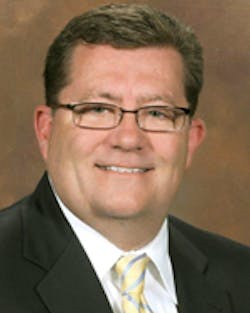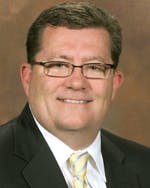Augusta University Health provides comprehensive healthcare for Georgia and the South
Professional:
Shawn P. Vincent currently serves as the Chief Operating Officer at Augusta University Health. He formerly served as Vice President for Partnerships & International Healthcare and Strategic Affiliations. Prior to joining Augusta University Health, he was Vice President of Operations with the Oncology Services Division of Hospital Corporation of America.
Education:
BA, Appalachian State University; MBA, University of Georgia.
Personal:
Mr. Vincent is a member of the American College of Healthcare Executives. He has served as Chairman of several philanthropic organizations. He serves as Chairman of the Columbia County Chamber of Commerce and is on the Executive Board of the Metro Family YMCAs, Warm Spring Hospital, and Wills Memorial Hospital.
For readers who are unfamiliar with Augusta University Health, what are some basic facts that they should know? Based in Augusta, Georgia, Augusta University Health is a world-class healthcare network, offering the most comprehensive primary, specialty, and subspecialty care in the region. Augusta University Health provides skilled, compassionate care to its patients, conducts leading-edge clinical research, and fosters the medical education and training of tomorrow’s healthcare practitioners. It is a not-for-profit corporation that manages the clinical operations associated with Augusta University.
Here is the health system by the numbers: a 478-bed Augusta University Medical Center (AUMC) at Augusta University; a 154-bed Children’s Hospital of Georgia (CHOG), including the region’s only Level IV NICU; more than 80 outpatient practice sites in one convenient setting (Medical Office Building); and a Critical Care Center, housing a 13-county regional Level I trauma center.
Being an academic health center, Augusta University Health has three primary missions: patient care, education, and research. As an academic health center, we must provide a full range of clinical services and maintain the infrastructure to foster education and research.
Our physicians have the most up-to-date knowledge and training. Many of our healthcare professionals train the next generation of caregivers, while others conduct pioneering research that improves medical diagnosis, treatments, and technology, bringing the medicine of tomorrow to patient care today. In short, Augusta University Health brings world-class clinicians, pioneering research, and the latest technologies and breakthroughs right here in Augusta.
How has Augusta been reviewed by The Joint Commission and other accrediting organizations? Augusta University Health continues to receive outstanding reviews from The Joint Commission (TJC). TJC surveyors continue to be extremely pleased with the overall performance of such a large and complex healthcare organization and the ability of our team members to provide high quality and service excellence to help our patients and their families.
What do you see as the greatest challenges facing your institution—or the industry in general—today and in the near future? Well, there’s quite a list; these are challenging times. I would include:
- Retiring labor force/staffing shortages
- Acquisition of new and advanced diagnostic technologies
- Increased demand for more complex lab tests and increased cost
- Declining reimbursement and narrowing provider networks
- Employee engagement regarding increasing workloads and stressful time constraints
- Patient satisfaction, in the context of frustration with increasing healthcare costs (copays/deductibles/prescription drugs).
Please describe the range of clinical lab services provided by the Augusta University Health System. We have routine laboratory testing for hematology, chemistry, immunology, blood bank, microbiology, and anatomic pathology. We also do a lot of specialty testing for coagulation studies, cytogenetics, molecular, and forensic urinalysis drug testing. We are a Cystic Fibrosis Center; we perform sweat chloride and other CF testing. We perform the histocompatibility and electron microscopy testing for both the donor and recipient of renal transplant. Because we have a Cancer Center, we also have specialized testing for bone marrow such as flow cytometry. In addition, AU Health is one of the only tissue donor collection sites for surgical/transplant patients. One of the benefits of this is that all tissue collected stays within the local area.
A year ago Augusta University Health System signed a 15-year alliance with Beckman Coulter to create innovative models of care utilizing technology and process improvement methodologies in the laboratory setting. How does this alliance fit with the mission of the laboratory services? A strategic managed services alliance was executed to provide for current and future capital needs and future growth of AUMC, while seeking to improve the quality and efficiency of operations and lower the overall cost of providing pathology services. The Department of Pathology (Clinical and Anatomical) processes approximately three million tests annually. Laboratory Services plays such a pivotal role in the diagnosis and treatment decisions of our patients that moving to an automated line with improved efficiency, accuracy, and timeliness of results will allow us to better meet the needs of our patients and providers.
In the short term we are performing Lean process improvement and 5S exercises with our alliance partner and our team members. The expertise that Beckman and its parent company, Danaher, bring to our health system has been invaluable. In the long term, we will implement a full Beckman Coulter Automation line with a full array of testing available and implement LC/MS testing for drug testing, immunosuppressant drugs, and therapeutic hormone levels.
Can you describe some of Augusta’s Centers of Excellence that allow it to provide top-notch adult healthcare? We have numerous Centers of Excellence that provide advanced diagnostics and innovative treatment options, but a few would include the following:
The Georgia Cancer Center, which is working toward NCI designation, includes a 167,000-square-foot research building and a comprehensive and integrated clinical facility that includes a four-vault radiation oncology center. These provide a platform for state-of-the-art research and treatment, including several first-in-human protocols
The Augusta University Neuroscience Center of Excellence is a regional referral center for the southeastern U.S. and includes the area’s largest, most diverse group of experts in adult and pediatric neurology and neurosurgery, including renowned experts in Parkinson’s disease, stroke, ALS, MS, functional and cerebrovascular neurosurgery, and complex spine surgery.
Comprehensive Digestive Health Center Specialty care includes the nation’s largest motility clinic and the region’s only neurogastroenterologist and fellowship training in various digestive health subspecialties, such as hepatology, inflammatory bowel disease, cancer, pancreatic and biliary medicine, and advanced endoscopy.
What are some pediatric specialties that are provided by Children’s Hospital of Georgia? CHOG has the region’s only nationally accredited and certified echocardiography (ECHO) lab for children with congenital and acquired pediatric heart defects. Also, as pioneers in ECMO (extracorporeal membrane oxygenation), we are one of only two hospitals in the state that offer lifesaving care by our team of ECMO specialists for critically ill children who need additional support of their heart and lung function. We have a comprehensive offering of pediatric services, including pediatric specialists in cancer, surgery, orthopedics, neurology, cardiology, cardiothoracic surgery, epilepsy, gastroenterology, urology, neurosurgery, and otolaryngology.
What affiliations allow Augusta to care for people across Georgia and the South? How is the system’s business plan designed to increase the institution’s “footprint”? In addition to providing care in the Augusta area, Augusta University Health clinicians travel to satellite practice sites throughout Georgia and South Carolina, illustrating our commitment to care for people across the region. As a result of some of the unique specialty care we are able to provide, we also treat patients from throughout the United States and more than a dozen countries.
Augusta University Health also is affiliated with Augusta University. Augusta University’s Health Sciences Campus is composed of the Colleges of Allied Health, Dental Medicine, Graduate Studies, and Nursing, and the Medical College of Georgia. It is also affiliated with faculty group practice plans, including the AU Medical Associates, the AU Dental Associates, the Allied Health Practice Group, and the School of Nursing Faculty Practice Group.
Our business plan continues to evolve based on the changing dynamics of the industry. Successful institutions will need to operate with high speed and intensity with low drag. Gaining scale through an expanded geographic footprint and additional assets that better align us to meet pay-for-performance and population health objectives will continue to be at the forefront of our strategy.


